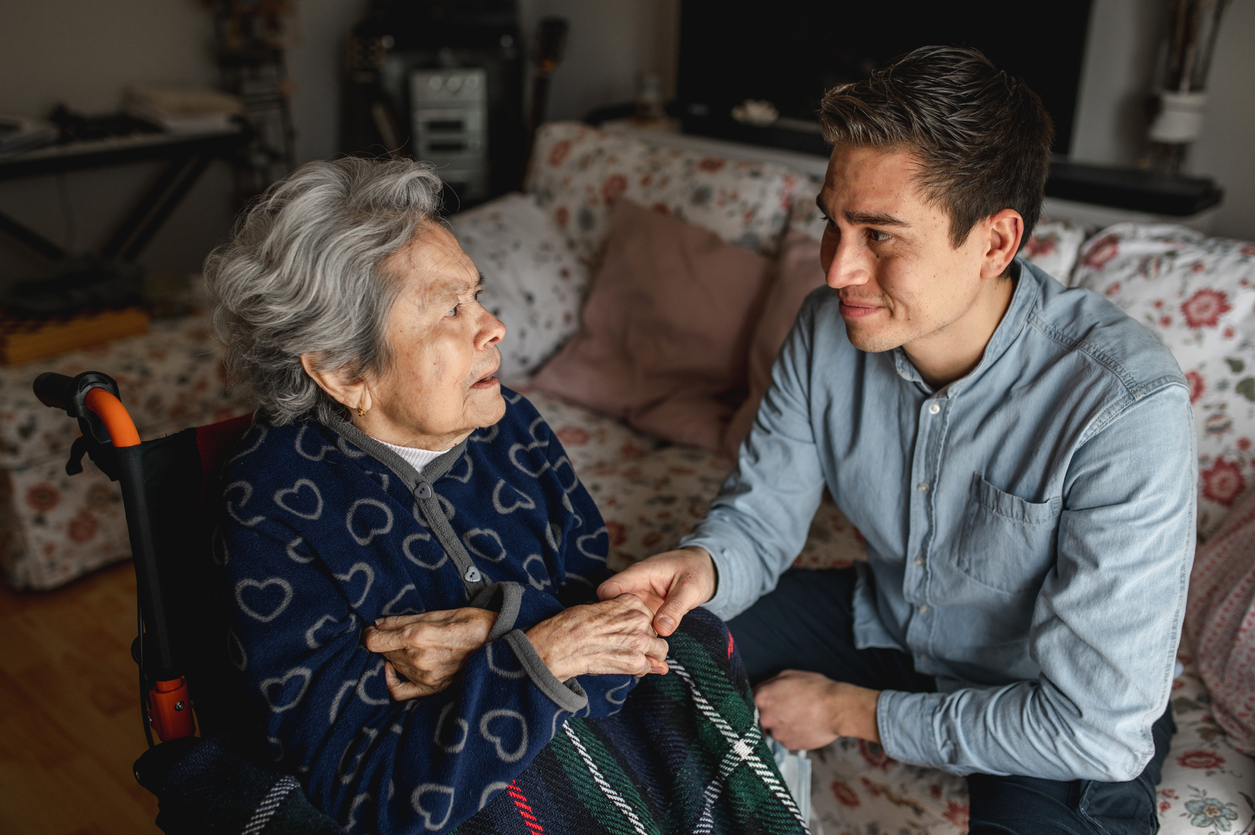HopeHealth volunteer Mark Gilchrist cared for his Aunt Kay through her journey with dementia, and now co-facilitates dementia caregiver support groups. He shares three things that transformed his approach as a caregiver, and that he’s seen work for others.
1. Work on accepting your loved one’s diagnosis, and where they’re at in their journey.
As a dementia caregiver, especially early in a loved one’s disease, it’s easy to hold onto old ideas of what your loved one can and should be doing. In hopes of helping them, you might find yourself arguing with them when they’re confused, or correcting them when they forget something.
The difficult truth is that dementia affects a person’s cognitive abilities, like thinking, remembering, and reasoning, as well as their behavior. Even tasks and memories that were once part of your loved one’s daily life may no longer be possible, no matter how many times you remind or ask them.
As heartbreaking as this new reality may be, Gilchrist’s biggest advice for other caregivers is to find a way to come to terms with it.
“Having resentment or anger against dementia is natural. But it doesn’t make a bit of difference,” he says. “Those are the feelings you have to reconcile.”
He’s seen what a relief it is – for both the care receiver and the caregiver – when a caregiver stops fighting with the fact of their loved one’s disease, and turns their attention to how to live with it.
“With a better acceptance and understanding, we can focus on helping our loved one be more comfortable,” he says.
Instead of resisting when they talk about someone who’s deceased as if they’re alive, maybe you ask them to tell you about that person. Instead of correcting your loved one when they’re upset about something that didn’t happen, maybe you redirect their attention to an activity that they enjoy. That leads to moments of comfort, and connection.
2. Learn about dementia from other caregivers who’ve been there.
Acceptance often grows out of awareness, says Gilchrist. But many dementia caregivers can’t get the information they need all on their own. A caregiver support group provides safe space to learn about how dementia progresses.
“Dementia is a continuum. In a caregiver support group, you’re able to hear from other people who have already experienced the step that you’re just entering,” says Gilchrist. At the same time, it offers invaluable emotional support.
“When you’re a caregiver, there’s so much isolation because you just can’t get out. But if you try going it alone, it’s very difficult,” he says. “In a support group, you hear other people talking about issues, and you go, wait a minute, I go through that all the time. It’s not just me. You realize that you’re not alone – and that you’re going to make it through.”
Support groups also connect members with specific resources and education. Members often trade tips for the everyday questions of caregiving, from suggestions for how to communicate with the medical community to brands of shower chairs and stovetop knob blocks. Every bit of information helps, and can open caregivers up to new approaches that make a big difference.
“Being in a group of other people who have seen it, who have lived it — it doesn’t solve the problem. But it makes the problem more identifiable, and gives you different approaches for dealing with it,” says Gilchrist.
- Looking for more information and resources? Sign up for HopeHealth’s free, virtual caregiver education.
3. Ask if your loved one is eligible for support services.
In the last couple years of Aunt Kay’s life, the greatest transformation in her care, and in Gilchrist’s experience as her caregiver, came from hospice services. Connecting with hospice was a big step for Gilchrist: When he first reached out to HopeHealth to see if his aunt was eligible, he worried it might somehow shorten her life (a common misconception).
What he found, instead, was that it enhanced it – by giving her a greater quality of life. Aunt Kay received hospice services at home for 18 months, until she passed away at age 102.
“It was a real wake-up call for me that there was a different way to go about her care,” Gilchrist says. “As a caregiver, there’s so much you don’t know. I’d been on my own, doing something I had no idea I’d have to do. The hospice team came in and supported me step by step.”
It also provided him with relief that he hadn’t fully realized he needed. A nurse arrived every week to take Kay’s vitals. An aide came three times a week to bathe her. A volunteer sat with her to give Gilchrist respite. A chaplain came by every few weeks to visit. A social worker called to offer support.
“Everyone helped me psychologically adjust and prepare for what was ahead,” says Gilchrist. “They helped both of us in so many ways.”
If you have a loved one with a life-limiting illness like dementia, they may qualify for support sooner than you realize. Reach out for a hospice evaluation today to connect with important resources.

